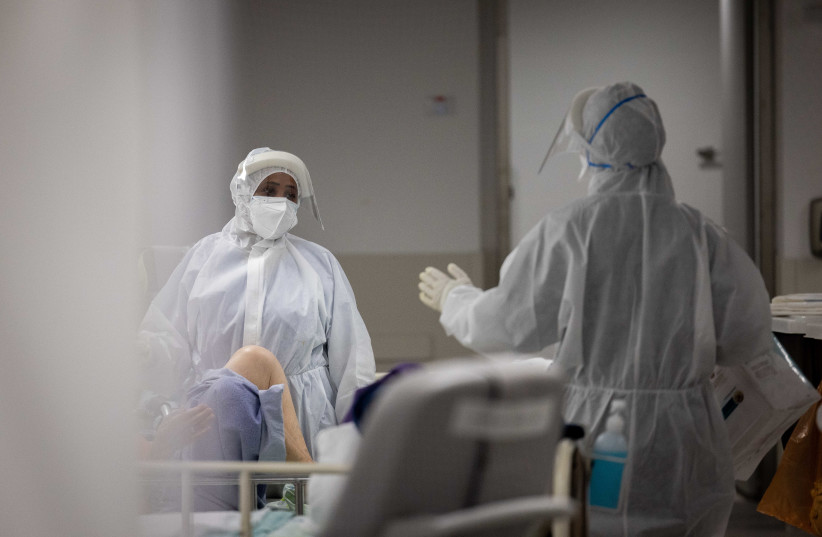The need to have a Green Pass will be limited to large events such as weddings, the coronavirus cabinet decided Tuesday evening, after Hebrew University of Jerusalem researchers said the peak of the Omicron wave is likely over.
Starting on Sunday, a Green Pass only will be needed at large events, the list of which has yet to be published. Locations that voluntarily set up an antigen testing stand as a requirement for entry will receive a partial subsidy from the government.
The Green Pass will also be updated to include those who have been vaccinated with two doses within the past four months, patients who have recovered in the past four months and anyone who has received the third or fourth dose of the vaccine without any time limit.
The cabinet also decided that from February 8, unvaccinated Israelis will be able to fly out of Israel without needing a coronavirus test before their departing flight. Travelers with symptoms who test negative with an antigen test will also be able to fly without needing a PCR test.
Entry into institutions under the Magen Avot program and homes for the elderly will require an antigen test, the cabinet decided.

During the coronavirus cabinet meeting, Prime Minister Naftali Bennett said the government would help businesses seriously impacted by the latest coronavirus wave.
“The details are still being discussed... we will not leave anyone behind,” he said.
Vulnerable populations needed to be protected until the current wave passes, Bennett said.
In a report presented to the coronavirus cabinet, the Hebrew University researchers said it seems that Israel has passed the peak and that infection rates and the rate of serious cases should drop in the coming weeks. However, infection rates would remain high for the next two weeks, the report said.
Currently, the testing system is not satisfactorily reflecting the actual infection rates, the researchers said. They called for formulating a method to figure out the true number of cases, especially due to concerns about the BA.2 sub-variant, to be able to detect any new outbreak.
The fourth dose of coronavirus vaccine has been shown to have a significant effect on reducing infection rates and illness, the researchers said, adding that it has also been useful for those who are already infected. According to the data presented to the cabinet, the fourth dose lowered the number of severe infections by a third.
Starting on Tuesday, PCR testing sites run by Home Front Command only will be available to people at least 30 years old and to high-risk groups.
The Interior Ministry permitted local authorities to conduct policy meetings virtually, as the number of serious COVID-19 cases soared on Tuesday.
Vaccinated people should be required to get tested before attending gatherings and should not have a shorter quarantine, the researchers said.
The change, initiated in a series of policies by Interior Minister Ayelet Shaked, was approved by the Knesset Internal Affairs and Environment Committee.
Defense Minister Benny Gantz praised the IDF for the initiative to distribute antigen test kits to children and encouraged the continued efforts to help educational institutions ride out this wave.
A total of 67,580 new COVID-19 cases were recorded on Monday, down from Sunday’s total of 74,312, the Health Ministry reported Tuesday. There are currently 425,000 active cases in Israel, it said.
The R rate, which indicates how many average number of new cases each virus carrier generates, is currently below 1, at 0.92. As the R rate decreases, so do the number of new daily cases since each person is on average passing the virus on to fewer people.
At last count, there were 1,084 serious cases, an all-time high and a 21.1% increase from the previous week, with 247 people on ventilators and 19 connected to ECMO machines. The positivity rate was 26.37%.
Of those currently hospitalized in serious condition, 520 were vaccinated, 117 were partially vaccinated, 427 were unvaccinated, and the status of the remainder is unknown. The majority of serious cases are being reported in people age 60 and over.
A total of 642,137 people have been vaccinated for COVID-19 four times, 4,442,029 three times, 6,093,060 twice, and 6,691,151 have received at least one vaccine.
To date, 8,804 people have died of COVID-19 in Israel since the start of the pandemic.
